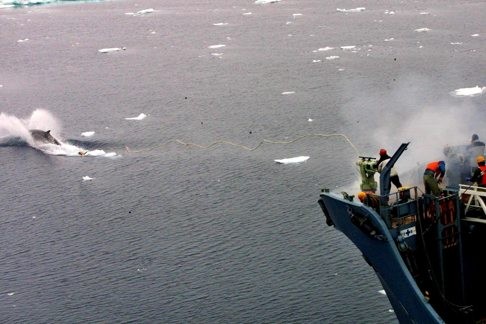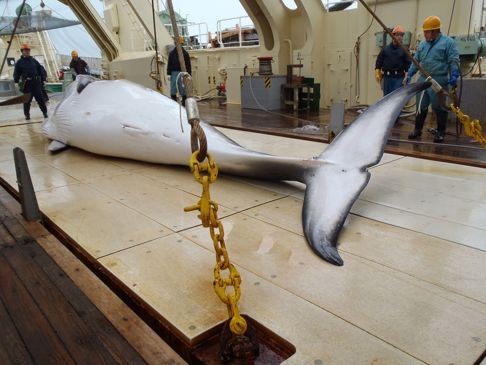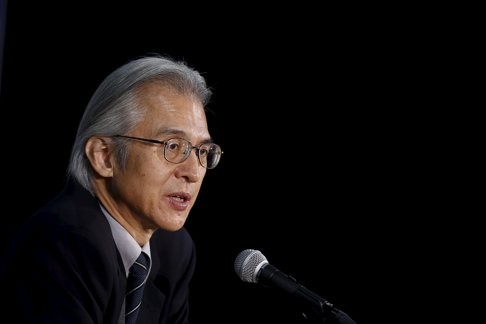33 countries protest Japan’s resumption of research whaling after it sends its hunting fleet to the Antarctic Ocean
Japanese vessels have left a port in western Japan to resume research whaling in the Antarctic for the first time since an international court ruled against the practice last year.
PUBLISHED : Monday, 07 December, 2015, 7:32pm
UPDATED : Monday, 07 December, 2015, 7:32pm
South Korean activists portraying Japanese fishermen spear a "whale" during a protest against Japan's whaling fleet going to the Antarctic to resume the slaughter of whales, near the Japanese embassy in Seoul. Photo: AFP
A coalition of 33 nations is opposing Japan’s recent decision to resume so-called research whaling in the Antarctic Ocean this season.
New Zealand led an international protest Monday against Japan's plans to resume killing whales, while Australia said it was considering further legal action.
Prime Minister John Key said New Zealand's ambassador to Tokyo delivered a “strong” formal message from the 33 countries, including the United States and Australia, to Japan.
“We consider that there is no scientific basis for the slaughter of whales and strongly urge the government of Japan not to allow it to go ahead,” Key said.
A Japanese whaling fleet set sail for the Antarctic last week, despite environmentalists slamming the move as a “crime against nature”.
Tokyo said last month it planned to kill 333 minke whales for scientific research this season, despite a worldwide moratorium and opposition led by Australia and New Zealand.
The fleet's departure marked the end of a year-long suspension prompted by a United Nations' International Court of Justice (ICJ) ruling in 2014 that the annual hunt was a commercial venture masquerading as research.
Australia, which hauled Japan before the ICJ in 2010 in a bid to end the annual hunt, would continue to raise concerns, Foreign Minister Julie Bishop said.
“We are working with other like-minded nations to build international consensus against Japanese whaling,” Bishop said.
“We are also exploring options for further legal action.”
New Zealand, which said Mexico, South Africa and EU member countries also joined the formal protest, said it would press for an end to “this outdated practice”.
Australia made clear lethal research was unnecessary.
“The science is clear: all information necessary for management and conservation of whales can be obtained through non-lethal methods,” Bishop said.
Tokyo claims it is trying to prove the whale population is large enough to sustain a return to commercial hunting, and says it has to kill the mammals to carry out its research properly.
Japan’s Commissioner to the International Whaling Commission, Joji Morishita, said Tokyo’s retooling of its hunt plan for the 2015/16 season, which cut the number of minke whales it takes by two-thirds to 333, made every effort to meet the objections of both the court and the IWC committee.
“We did our best to try to meet the criteria established by the International Court of Justice and we have decided to implement our research plan, because we are confident that we completed the scientific homework as well as ... meeting the ICJ judgement requirement,” Morishita said.
Morishita added that the emotive issue may just be another one of many irreconcilable differences international society has to live with.
“The solution is that we have to agree to disagree,” he said.
“However, this does not mean that we will take all whales - exactly because we’d like to have sustainable whaling, we’d like to have a healthy whale population.”
Environmentalists from Sea Shepherd Australia have vowed to pursue the Japanese fleet and aim to intervene in any slaughter of the animals, as it has done for the past decade.
Their vessel the Steve Irwin was due to leave Melbourne on Monday evening for Western Australia, before it leaves for the Southern Ocean on a mission to halt illegal fishing.
Agence France-Presse, Reuters



No comments:
Post a Comment